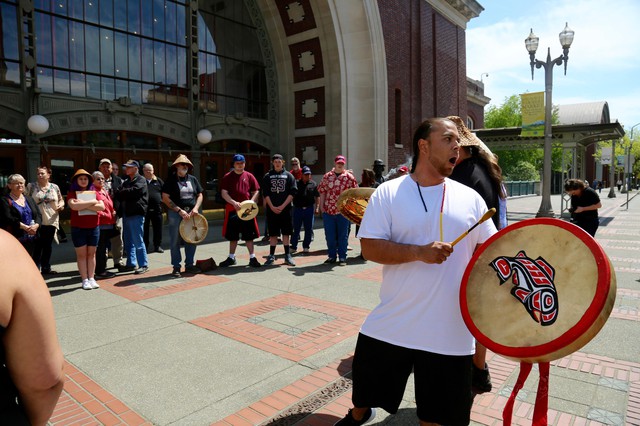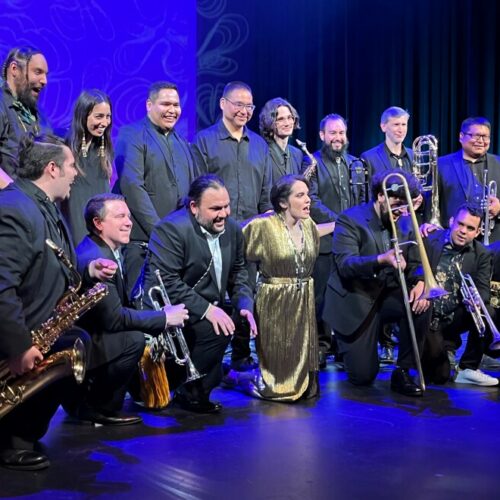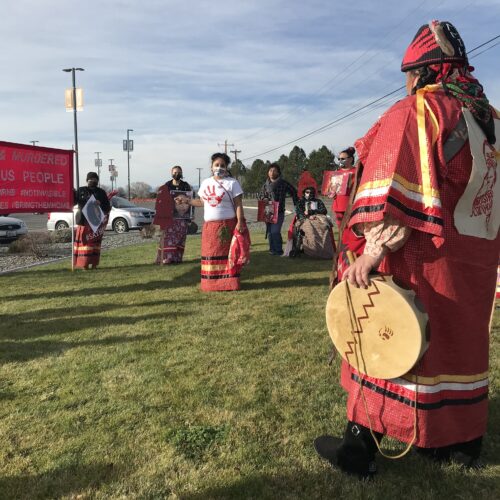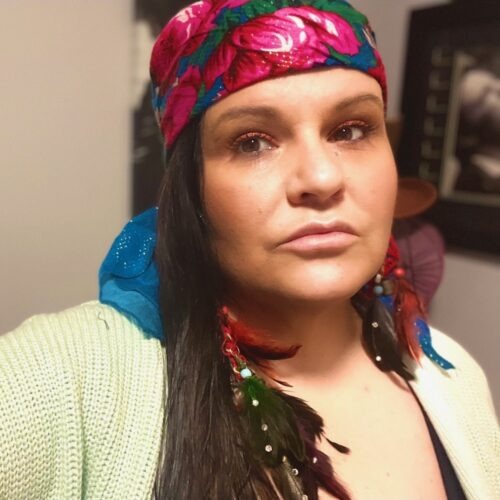
Chinook Tribe Back In Court On Long Quest To Regain Federal Recognition
READ ON
The decades-long quest of Chinook tribal members to regain federal recognition gets another airing in court on Monday. A U.S. District Court judge is scheduled to hear oral arguments on cross-claims for summary judgment in a lawsuit brought by the tribe against the Department of the Interior.
The Chinook people are the original inhabitants around the mouth of the Columbia River. The U.S. Congress never ratified the treaty that the tribe and other coastal bands signed in 1851. The Chinook hired its first lawyers to fight for land rights in 1899 and its legal battles continue in various forms all the way to today.
Current Chinook tribal chairman Tony Johnson said the tribe is now focused on asking a federal judge for the right to reapply for federal recognition. Federal status opens the door to self-government and to myriad government programs for social services, education and economic development.
“We have all the problems of Indian Country and yet none of the means of fixing it or dealing with those issues that other communities have,” Johnson said in an interview. “Whether that is issues around housing, or around health care, or around mental health issues, or drug and alcohol, these are things that other tribal communities have resources to be able to address.”
Johnson said the Chinook tribal community was heartened by the recent victory of a Montana tribe in a similar predicament. The Little Shell Tribe of Chippewa was federally recognized by an act of Congress signed a few days before Christmas.
“This is a multi-generational fight for social justice that our community has been involved with,” Johnson said Friday. “It just feels like the time is right to finally have the federal government address this issue.”
Chinook tribal members and supporters plan a Monday afternoon rally with speeches, singing, drumming and possibly dancing outside the federal courthouse in Tacoma ahead of the scheduled oral arguments inside.
The case in front of Judge Ronald Leighton dates to 2017. The following year, Leighton rejected the Chinook Indian Nation’s request that his court confer federal recognition on the disenfranchised tribe, saying it was not in his power to do so. But Leighton let other requested remedies proceed for further argument, which is what brings the lawyers together again now. The judge is not expected to decide the case on Monday.
In its briefs, the Interior Department asked Judge Leighton to fully dismiss the case. Assistant U.S. Attorney Brian Kipnis argued a lawfully-made change to the tribal recognition process in 2015 forbids a tribe that has been previously denied from re-petitioning for acknowledgement.
“Having already unsuccessfully petitioned the Department, plaintiffs’ path forward for obtaining acknowledgment as a federally recognized Indian tribe is through a petition addressed to Congress rather than by a second petition addressed to the Department,” Kipnis wrote.
A related issue up for argument is whether to restore a land claims settlement fund that was held in trust for the Chinook tribe by the Interior Department for many decades. The never-distributed funds are worth about $500,000, according to court filings.
The Chinook Nation’s constitution identifies five constituent Lower Columbia tribes — the Clatsop and Cathlamet on the Oregon side of the river and the Lower Chinook, Wahkiakum and Willapa on the Washington side. The tribal headquarters are presently in Bay Center, Washington. The tribal corporation has acquired some land in its ancestral domain that could become the nucleus for a future reservation.
The Chinook Nation was briefly recognized in 2001 in the waning days of the Clinton administration, but had its status revoked months later by the incoming Bush administration. The leadership of President George W. Bush’s Interior Department questioned whether the Chinook tribe maintained organizational continuity through the latter part of the 19th century and early 20th century, as required for federal recognition.
The Chinook recognition process has encountered a number of flashpoints since that have slowed forward progress. The Quinault Nation up the coast in Grays Harbor County, Washington, voiced objections to federal agencies. Official recognition of the Chinook raises thorny issues for neighboring tribes and non-tribal fishermen who fear dilution of fishing rights, among other issues.
Pacific Northwest members of Congress have shown interest in introducing legislation to confer federal recognition, but the most recent efforts by U.S. Rep. Suzanne Bonamici (D-Ore.) were sidetracked by an inter-tribal dispute. In 2014, 2015 and 2017, Bonamici proposed to recognize the Clatsop-Nehalem Confederated Tribes of Oregon. That drew objections from the Chinook council, which repeatedly said the Clatsop people belong under the wider umbrella of the Chinook Indian Nation. Each of Bonamici’s bills died in committee without a hearing.
Related Stories:

To ‘Honor The Shoulders We Stand On:’ Big Band Premieres With Nod To History Of Native Jazz Musicians
A scheme to entertain a 4-year-old youngster in Spokane by playing a jazz album nearly three decades ago produced a cascade of aftereffects that culminated on stage in Olympia, Washington, this month with crescendos of horns and multiple standing ovations. During the debut of a 16-piece, all-Indigenous big band, the performers on stage hearkened even further back in history to celebrate the little-known, but long line of Native jazz musicians and big bands.

What The ‘Bring Them Home’ Law Means For MMIP
Washington’s “Bring them home” law takes effect in June. It allows tribal members to pray over a deceased indigenous person without compromising the scene before an autopsy is conducted, and supports survivors of trafficking.

Native Americans Wearing Traditional Ukrainian Scarves In Support of Ukraine
Brandi Morin, of the Cree Nation, says she is wearing a scarf in support of Ukraine / Photo Courtesy of Brandi Morin Read Listen: Anna King reports on Native Americans















